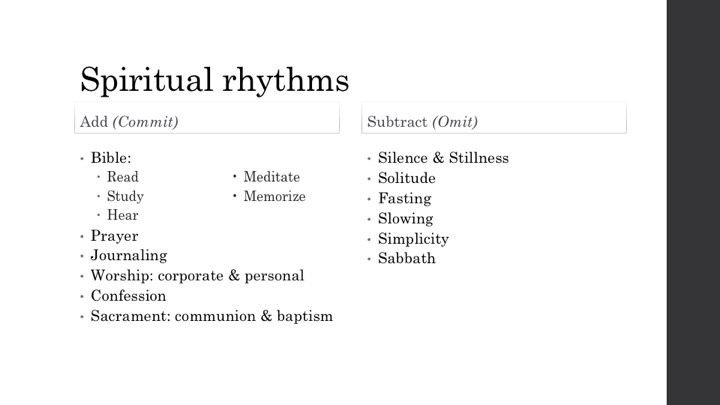 Last week I wrote that the church needs to quit trying to make disciples and focus instead on reproducing disciples. That is, we need to shift our mindset from production to reproduction. Today I want to address some of the key differences between those two mindsets: process, efficiency, and fertility.
Last week I wrote that the church needs to quit trying to make disciples and focus instead on reproducing disciples. That is, we need to shift our mindset from production to reproduction. Today I want to address some of the key differences between those two mindsets: process, efficiency, and fertility.
Process. When my wife and I decided to have children (as if it was really up to us!), we didn’t first sit down and plot what those children would look like as adults. We didn’t list the steps by which our babies would be transformed into full-grown, fully-functioning men or women. We knew there would be a variety of phases—infancy, childhood, adolescence, teenager—and we read a variety of resources that we hoped would help along the way. Mostly, though, we just held hands, and held our breath, and dove unprepared into the terrifying world of parenthood.
A plethora of child-rearing books is available to parents, each with its own litany of steps and hints and must-do’s to raise successful kids. Many of those resources agree on basic principles; many have blatantly convicting advice. And as any new parent quickly realizes, the collective tips and counsel from parents, friends, and complete strangers is no more congruous. We realize just as quickly that our child is unlike anyone else’s; in fact, children from the same parents are totally unique—even fraternal twins, for all their biological similarities, have unique personalities. Given these uniquenesses, we cannot squeeze children through a production mold.
Nor are any two disciples the same. Nurturing one spiritual infant through adolescence and into (or at least toward) spiritual maturity will not follow the same path as for any other. There will be similarities; there is a body of knowledge that can be taught, along with a number of skills. Habits can be developed that are indicators of growing maturity. But the paths to maturity diverge quickly, flowing through the unique experiences that each individual faces. Reproducing disciples doesn’t have a set process.
Efficiency. During my undergraduate business studies, I took a fascinating course called Production Operations Management. During the semester, we studied the host of ways businesses streamline their processes to achieve maximum efficiency. We learned about satellite-guided trucking and Just-In-Time (JIT) delivery. We learned how computers are used to map the maximum number of different pieces to cut from a single sheet of plywood. Every hour and every mile saved in shipping, every former scrap that can be used in the final product, every reduction in storage time—every gain in efficiency—contributes to a company’s profits and therefore its success.
Similar thinking has crept into the western church: if we can just get more people into the church to hear the gospel, then more will become followers of Jesus. If we can teach those followers all at once what they all need to know, then more will become disciples sooner. This type of thinking—born out of an honest and righteous desire to expand God’s kingdom—is at the heart of the church growth movement, the multi-site phenomenon, and radio and TV ministries. It’s not necessarily bad, but it needs to be looked at more critically than it probably has been.
Reproduction in the human world is inherently inefficient. Spiders and fish may give birth to thousands of little spiders and fish; but among humans, multiple births are rare. According to the Centers for Disease Control, the twin birth rate is less than 34 per 1,000 live births (0.337%); the rate for triplets and more is 119.5 per 100,000 (0.12%). Our physical, mental, emotional, and social systems aren’t designed for greater efficiency. Neither are our spiritual systems. The apostle Paul frequently used the language of parenthood when speaking of those whose faith he nurtured. He called both Timothy and Titus his “true sons in the faith.” He wrote to the Thessalonians about having nurtured them “like a nursing mother taking care of her own children” (1 Thess 2:7). No mother can nurse more than two children at a time! Reproducing disciples is not efficient.
Fertility. Early in our marriage, my wife and I were part of a Sunday School class for young couples. During the three years we were part of that class, not a month went by that we didn’t have three couples pregnant. Jokes abounded about our collective fertility, usually centering around the donuts that were served each week. But as time passed and different couples moved on to their second and third pregnancies, we also began to realize that among us were couples who weren’t having babies…but who wanted to, and with increasing desperation.
It’s clear from Scripture that not every couple will be able to have children. It’s also clear that children, when they do come, are a gift from the sovereign God. In similar fashion, we don’t make disciples—God does; we are, however, entrusted with the responsibility to nurture disciples: to train, teach, love, and correct, all with the aim of growing those disciples into maturity and releasing them to nurture more disciples. Reproduction, not production.
The challenge of discipleship in the western church is as much cultural as it is spiritual. In the industrialized, individualized west, we want to make everything big, streamlined, and efficient. We create processes and seek endlessly to improve those processes in order to turn out products in ever-increasing numbers. Discipleship, however, is small, bumpy, and terribly inefficient. It looks more like parenting than manufacturing. Reproduction, not production. Next week I will dive more into this parenting analogy and what that might look like in a church.


 Silence and stillness are the two most radical spiritual disciplines that need to be injected into a paradigm shift of how we do discipleship in our churches. They are indispensable to slow our people down so they cultivate a first-hand, personal relationship with Jesus.
Silence and stillness are the two most radical spiritual disciplines that need to be injected into a paradigm shift of how we do discipleship in our churches. They are indispensable to slow our people down so they cultivate a first-hand, personal relationship with Jesus. I spent the first half of my life in wet climates: western Canada, Germany, England, Seattle. Most of the last half has been in San Diego, with its incessant sun and persistent 70-degree weather. So when I awoke this morning to the sound of rain pouring down on the metal roof of our condo, I looked forward to cozying up on the couch in the early morning quiet, sipping my coffee, and looking out the window at the rain.
I spent the first half of my life in wet climates: western Canada, Germany, England, Seattle. Most of the last half has been in San Diego, with its incessant sun and persistent 70-degree weather. So when I awoke this morning to the sound of rain pouring down on the metal roof of our condo, I looked forward to cozying up on the couch in the early morning quiet, sipping my coffee, and looking out the window at the rain.